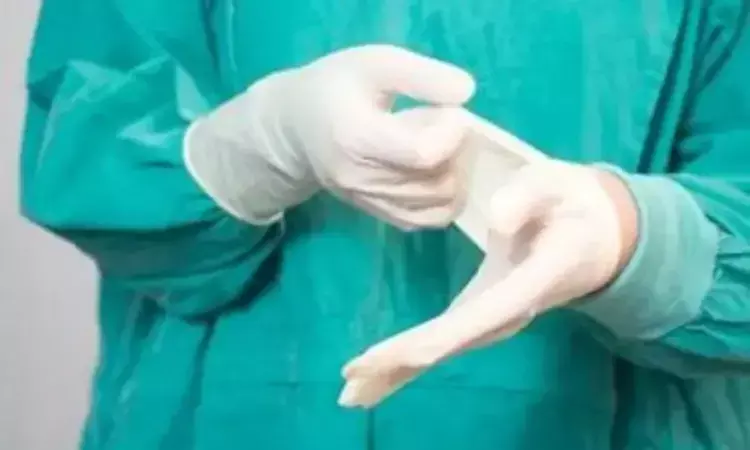- Home
- Medical news & Guidelines
- Anesthesiology
- Cardiology and CTVS
- Critical Care
- Dentistry
- Dermatology
- Diabetes and Endocrinology
- ENT
- Gastroenterology
- Medicine
- Nephrology
- Neurology
- Obstretics-Gynaecology
- Oncology
- Ophthalmology
- Orthopaedics
- Pediatrics-Neonatology
- Psychiatry
- Pulmonology
- Radiology
- Surgery
- Urology
- Laboratory Medicine
- Diet
- Nursing
- Paramedical
- Physiotherapy
- Health news
- Fact Check
- Bone Health Fact Check
- Brain Health Fact Check
- Cancer Related Fact Check
- Child Care Fact Check
- Dental and oral health fact check
- Diabetes and metabolic health fact check
- Diet and Nutrition Fact Check
- Eye and ENT Care Fact Check
- Fitness fact check
- Gut health fact check
- Heart health fact check
- Kidney health fact check
- Medical education fact check
- Men's health fact check
- Respiratory fact check
- Skin and hair care fact check
- Vaccine and Immunization fact check
- Women's health fact check
- AYUSH
- State News
- Andaman and Nicobar Islands
- Andhra Pradesh
- Arunachal Pradesh
- Assam
- Bihar
- Chandigarh
- Chattisgarh
- Dadra and Nagar Haveli
- Daman and Diu
- Delhi
- Goa
- Gujarat
- Haryana
- Himachal Pradesh
- Jammu & Kashmir
- Jharkhand
- Karnataka
- Kerala
- Ladakh
- Lakshadweep
- Madhya Pradesh
- Maharashtra
- Manipur
- Meghalaya
- Mizoram
- Nagaland
- Odisha
- Puducherry
- Punjab
- Rajasthan
- Sikkim
- Tamil Nadu
- Telangana
- Tripura
- Uttar Pradesh
- Uttrakhand
- West Bengal
- Medical Education
- Industry
Prophylactic wound irrigation with antiseptic solutions may reduce surgical site infections: JAMA

Surgical site infections (SSIs) remain a significant concern following surgeries by leading to complications, increased mortality rates and economic burdens. A recent comprehensive study published in the recent issue of Journal of American Medical Association highlights the effective preventive measures in the field of intraoperative wound irrigation.
This study rigorously examined randomized clinical trials and compared various types of prophylactic intraoperative incisional wound irrigation methods for their effectiveness in preventing SSIs across different surgical procedures. The study analyzed data from PubMed, Embase, CENTRAL and CINAHL databases up until June 12, 2023. Out of 1587 articles reviewed, 41 RCTs were included which encompassed a total of 17,188 patients and 1328 reported SSIs.
The findings revealed strong evidence that support the use of antiseptic solutions for intraoperative wound irrigation. When compared to no irrigation, the antiseptic solutions demonstrated a significant reduction in SSIs with a relative risk (RR) of 0.60 (95% CI, 0.44-0.81) and this was backed by a high level of certainty.
Similarly, antibiotic solutions expressed positive outcomes in reducing the risk of SSIs though with a lower level of certainty (RR 0.46; 95% CI, 0.29-0.73). Caution is imperative due to concerns regarding global antimicrobial resistance that prompts advise against routine use of antibiotic wound irrigation. The saline irrigation failed to show a statistically significant difference when compared to no irrigation, with a moderate level of certainty (RR 0.83; 95% CI, 0.63-1.09).
The benefits of these findings are profound for healthcare professionals and policymakers. Thereby, by implementing antiseptic solutions for intraoperative wound irrigation, hospitals and surgical teams can potentially reduce the occurrence of SSIs clinicians can enhance patient outcomes and reducing healthcare costs.
The study emphasized the importance of evidence-based practices in surgical settings. The findings underline the effectiveness of antiseptic solutions in preventing SSIs. This could urge caution regarding the use of antibiotic solutions after considering the possible threat of antimicrobial resistance. Overall, this study provides valuable inputs for improving patient care and highlights the ongoing need for judicious antimicrobial stewardship in healthcare settings.
Reference:
Groenen, H., Bontekoning, N., Jalalzadeh, H., Buis, D. R., Dreissen, Y. E. M., Goosen, J. H. M., Graveland, H., Griekspoor, M., IJpma, F. F. A., van der Laan, M. J., Schaad, R. R., Segers, P., van der Zwet, W. C., Orsini, R. G., Eskes, A. M., Wolfhagen, N., de Jonge, S. W., & Boermeester, M. A. (2024). Incisional Wound Irrigation for the Prevention of Surgical Site Infection. In JAMA Surgery. American Medical Association (AMA). https://doi.org/10.1001/jamasurg.2024.0775
Neuroscience Masters graduate
Jacinthlyn Sylvia, a Neuroscience Master's graduate from Chennai has worked extensively in deciphering the neurobiology of cognition and motor control in aging. She also has spread-out exposure to Neurosurgery from her Bachelor’s. She is currently involved in active Neuro-Oncology research. She is an upcoming neuroscientist with a fiery passion for writing. Her news cover at Medical Dialogues feature recent discoveries and updates from the healthcare and biomedical research fields. She can be reached at editorial@medicaldialogues.in
Dr Kamal Kant Kohli-MBBS, DTCD- a chest specialist with more than 30 years of practice and a flair for writing clinical articles, Dr Kamal Kant Kohli joined Medical Dialogues as a Chief Editor of Medical News. Besides writing articles, as an editor, he proofreads and verifies all the medical content published on Medical Dialogues including those coming from journals, studies,medical conferences,guidelines etc. Email: drkohli@medicaldialogues.in. Contact no. 011-43720751


